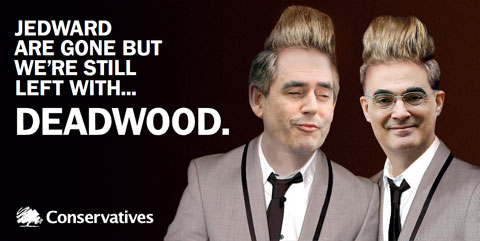
The Conservatives are using their digital media sites to display a poster capitalising on the end of Jedward. (Actually, they are probably also astutely aware that they will get far more coverage using just a few poster sites and having a viral campaign as lots of people blog, tweet and email about their poster.)
And I have to say I’m not terribly comfortable with it. Last week I commented on political insults and this probably falls into that category. But while I’m generally comfortable with the types of insult or barb I mentioned I can’t help but feel this is just a tiny bit childish.
I think it’s because it isn’t based in policy, nor is it particularly witty and nor is a comment from an individual, but the party corporately. It’s a bit of Photoshop and a weak pun. A few weeks ago I had been wondered if there was any play in using ‘deadwood’ for David and Ed Miliband. At least they are brothers, and it works with their names. But even then it just isn’t funny and doesn’t really work – there seems to be some substance to Ed Miliband.
I’m really not sure what this is meant to be doing. Are we trying to say that Conservatives watch X Factor and are down with the kids? I’m not really sure. Yes, some Tories do watch it. Others don’t. I tend towards the latter, having watched just one act – Jedward – a few weeks ago. Are we trying to make make some political commentary, following the age-old tradition of satire? Again, I don’t really see how it works. Or are we just trying to attract attention? I think that’s probably the most likely explanation.
If the narrative of the next election is about the very serious work the next government will have to do to repair the country after years of mismanagement then the parties should be serious. It’s OK for David Cameron or William Hague (who is superb at this sort of thing) to use humour to make political points, on that level it is effective and can be devestating. But collectively, surely the party should be above petty posters like this. We should be illustrating how Labour policy has failed and the Conservative policy alternative. We have so much more to say, and I don’t think this is the way to say it.
Here we are trying to compare a couple of guys who have tried their best, but only really succeeded in attracting scorn and pity in equal measure, with John and Edward Grimes. It doesn’t work.
